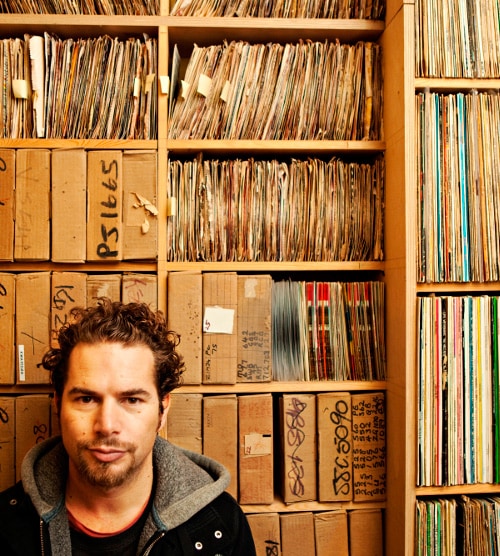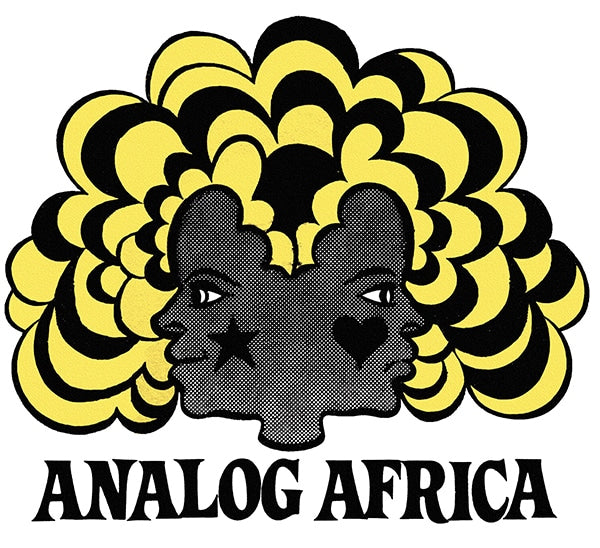“Greetings, funky friends.”
So began a recent email announcing the latest release from one of my favorite music labels, Analog Africa. Launched in 2007, AA has so far produced 44 ear-opening reissues and compilations of rare and little-known music from the 1960s, 1970s, and 1980s. As the name suggests, the label’s catalog is mostly focused on Africa, but there are also several titles from South America.
Analog Africa is based in Frankfurt, Germany, home of the label’s founder and owner, Samy Ben Redjeb (SBR). Originally from Tunisia, SBR developed his ear for funky dance music while DJing in Dakar, Senegal. As his collection of African music grew, he found that the rawer styles he preferred weren’t always so popular with the disco crowd. Later, during a stint as a flight attendant for Lufthansa, he made about a thousand trips to various African cities, using his free time during layovers to hunt for records.
Some Western listeners have been introduced to African music from countries like Mali and Nigeria through international superstars like Salif Keita and Fela Kuti. But many other nations have deep music scenes that are still relatively unknown. AA has focused on the music of those countries, including Benin, Togo, Ghana, Cameroon, and Burkina Faso, among others.
SBR personally chooses every cut on every Analog Africa compilation. When assembling a compilation he may listen to 1,000 tracks or more in order to end up with 14 or so keepers. He gradually whittles down the number of tracks to a few dozen candidates, then listens to them again and again over the course of months, gradually discarding the ones he tires of. Once he decides on the final track selection, sequencing them for optimal flow can take several more months.

Samy Ben Redjeb.
Besides going to great lengths to gather the choicest cuts, and ensuring that these less-than-pristine sources sound their best, AA consistently provides deluxe packaging, including liner notes that may run to 40 pages or more. These booklets don’t include song lyrics, which nearly always aren’t in English. Nor will you find technical specs on the recording process or equipment used. What you will find are Samy Ben Redjeb’s personal stories of how each recording came to be, fleshed out with interviews with musicians and producers, plus loads of great photos.
With a name like Analog Africa, you’d expect the label to be vinyl-focused, but that’s not necessarily the case. The recordings are virtually all-analog, but the music is digitized prior to re-mastering. Each release is initially available as an LP, CD, or digital download (check out AA’s Bandcamp page). Some LP titles are pressed on audiophile-approved 180-gram vinyl, while others get more typical 140-gram vinyl.
Samy Ben Redjeb himself has said that the CD and vinyl versions usually sound very close, and that he sometimes prefers the CDs for their more detailed sound. I’ve only purchased CD versions so far, and played through my current DAC – the Benchmark DAC3 HGC – they sound clean, clear, and dynamic. If you’re on the fence, one reason to consider vinyl is that the format provides a bigger canvas for Analog Africa’s cool, colorful artwork.
I’d been hosting a world music radio show for a few years before I discovered Analog Africa, and when I did, it was a real revelation. I’d simply had no idea that this type of music was being made during this time period, in these places. I return to AA’s compilations often, both for radio play and for listening at home. Although it’s been decades since these tracks were originally laid down, they always sound fresh, funky, and fun!
Every Analog Africa compilation is packed with groovy tunes, but if you’re wondering where to start, I’d suggest Afro-Beat Airways. You might associate Afrobeat with the pioneer of the genre, the late Fela Kuti, but much of Afro-Beat Airways doesn’t feature his slow-burn style. The selection here, by the Togolese band Orchestre Abass, sounds like it owes as much to Bo Diddley as to Fela. What stands out to me is the raw energy that infuses this and every other cut on this compilation.
Awula Bo Fee Ene (Orchestre Abass):
AA is mainly known for its collections that feature several bands representing certain musical styles. But their catalog also includes titles showcasing a single artist or band. For Orchestre Poly-Rythmo de Cotonou, a band hailing from Cotonou, Benin, Analog Africa actually released three CDs culled from dusty cartons of vinyl and master tapes that SBR found in a warehouse. Echos Hypnotiques is volume two of the three, and probably my favorite for its consistency. This is one of the greatest African bands ever!
Mi Ve Wa Se:
Burkina Faso is a landlocked country in West Africa with a diverse music scene that draws influences from neighboring countries like Mali, Ivory Coast, and Ghana. The jangly guitar and upbeat pop energy of “Rog Mik Africa” make it a bit of an outlier in AA’s Bambara Mystic Soul compilation.
Rog Mik Africa (Orchestre CVD):
Amara Toure first made his name as the lead singer and percussionist for Le Star Band de Dakar, who helped popularize Afro-Cuban music in Senegal in the late 1950s and early 1960s. After 10 years with the Star Band, he cut records with two other Afro-Cuban groups: L’Ensemble Black & White in Cameroon, and L’Orchestre Massako in Gabon. The AA release Amara Toure collects music from his Cameroon and Gabon periods. These atmospheric songs make for great late night listening.
Lamento Cubano (with L’Ensemble Black & White):
Here’s a link to a Spotify playlist featuring music from Analog Africa:
Header image of Samy Ben Redjeb from the Analog Africa website.



